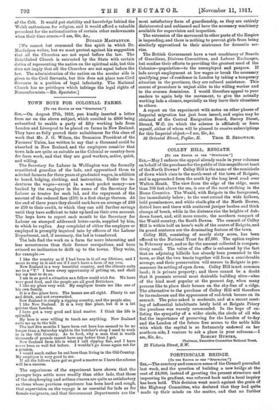TOWN BOYS FOR COLONIAL FARMS.
[To TAX EDITOR OP Ta1 " SPPOTATOP.."]
Six,—On August 27th, 1910, you kindly inserted a letter from me on the above subject, which resulted in £800 being
subscribed to enable a party of fifty working lads from London and Liverpool to be placed on farms in New Zealand.
They have so fully proved their suitableness for this class of work that Mr. J. G. Wilson, the Dominion President of the Farmers' Union, has written to say that a thousand could be absorbed in New Zealand, and the employers consider that town lads are quite as suitable as the Colonial or country-born for farm work, and that they are good workers, active, quick, and willing.
The Secretary for Labour in Wellington was the formally constituted guardian of the lads, and apprenticed them to selected farmers for three years at graduated wages, in addition to board, lodging, clothing, and instruction. Under the in-
dentures the wages—except le. a week pocket money—are banked by the employer in the name of the Secretary for Labour as trustee for each lad, and the repayment of the amount of the reduced fare (E10) is a first charge thereon. At
the end of three years they should each have an average of £80 or £90 to their credit, to which they can add further savings until they have sufficient to take upland on their own account. The boys have to report each month to the Secretary for Labour on stamped addressed letter-cards, supplied by him, to which he replies. Any complaint of either the employer or employed is promptly inquired into by officers of the Labour Department, and, if necessary, the lad is transferred.
The lads find the work on a farm far more interesting and less monotonous than their former occupations, and have evinced no inclination to drift up to the towns. They write, for example :—
I like the country as if I had been in it all my lifetime, and I mean to stay in it and see if I can't have a farm of my own.
New Zealand is a very beautiful country, and the climate suits me to a "T." I have every opportunity of getting on, and shall try my best to do so.
I am in as good a situation as a fellow could wish for. We have very good food, and the people are all good Britishers. I like my place very well. My employer treats me like one of his own family.
It is a fine place here. The bosses are all right. Plenty to eat and drink, and not overworked.
New Zealand is simply a ripping country, and the people also. I like New Zealand. It is a very fine place, but it is a lot quieter than London. I have got a very good and kind master. I think the life is splendid.
My boss is ever willing to teach me anything. New Zealand suits me up to the hilt.
The last five months I have been out here has seemed to be no longer than a Saturday night in the butcher's shop I used to work in in the Old Country. As to food, why a man that is worth thousands of pounds cannot have any better than I get. New Zealand farm life is what I call ripping fine, and I have never been so well fed before. I wouldn't go home again not for a pension.
I would much rather be out here than living in the Old Country. My employer is very good to me.
If all the fellows have got as good a master as I have the scheme will be a success.
The experiences of the experiment have shown that the younger boys settle more readily than older lads, that those of the shopkeeping and artisan classes are quite as satisfactory as those whose previous experience has been hard and rough, that supervision on the voyage is as essential for lads as for female emigrants, and that Government Departments are the most satisfactory form of guardianship, as they are entirely disinterested and unbiassed and have the necessary machinery available for supervision and inspection.
The extension of the movement to other parts of the Empire is impending, and there is nothing to prevent girls from being similarly apprenticed to their mistresses for domestic ser- vice.
The British Government have a vast machinery of Boards of Guardians, Distress Committees, and Labour Exchanges, but confine their efforts to providing the greatest need of the Colonies—population—to the unemployed and paupers. If lads accept employment at low wages or break the necessary qualifying year of residence in London by taking a temporary situation in the provinces, they are refused assistance. This course of procedure is unjust alike to the willing worker and to the oversee dominions. I would therefore appeal to your readers to again help the movement, to give the actually working lads a chance, especially as they leave their situations to others.
A report on the experiment with notes on other phases of Imperial migration has just been issued, and copies may be obtained of the Central Emigration Board, Surrey Street, Strand, W.C. (to which the scheme is affiliated) or from myself, either of whom will be pleased to receive subscriptions for this Imperial object.—I am, Sir, &c.
26 Oriental Street, Poplar, E. Taos. E. SEDGWICK.


















































 Previous page
Previous page